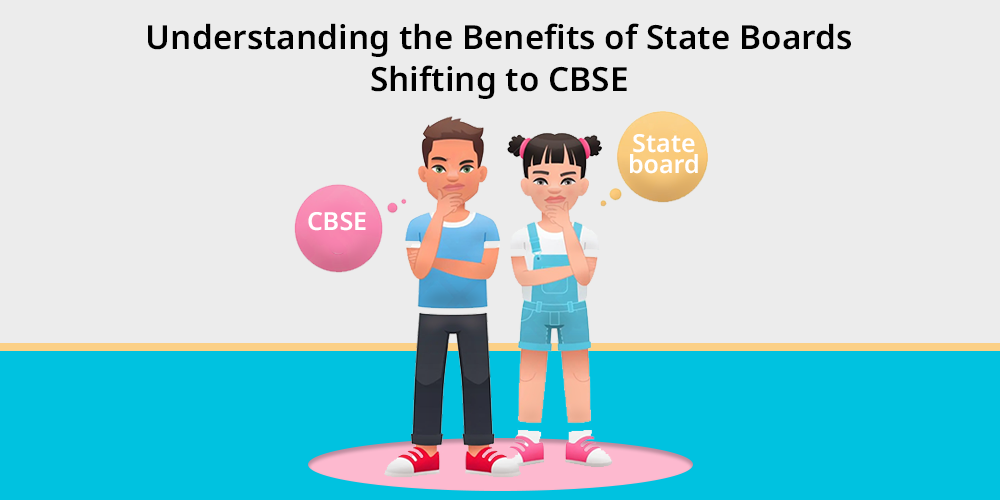
Choosing the right education board for the development of a student’s academic journey is a very crucial decision. It significantly influences their whole journey to life.
Now when we talk about the education board, it redirects us towards the most common debate among families and students is whether CBSE or State board is a better option.
They have their pros and cons, so before we come to any conclusion, there is a need to understand both of them precisely.
Let’s delve into this blog that talks about their key differences and helps you to choose the right one.
Contents
- What is the State Board?
- What is CBSE?
- Things to Consider When Transitioning From State Board to CBSE
- CBSE Curriculum Tough Why Still Transition From State Board to CBSE
- Transitioning From One Board to Another will Affect Student Mental Health
- Difference Between CBSE and State Board
- Advantages and Disadvantages of CBSE Board
- Advantages and Disadvantages of State Board
- Advantages of CBSE over State Boards
- CBSE vs State Boards Which is Better for Student Future
What is the State Board?
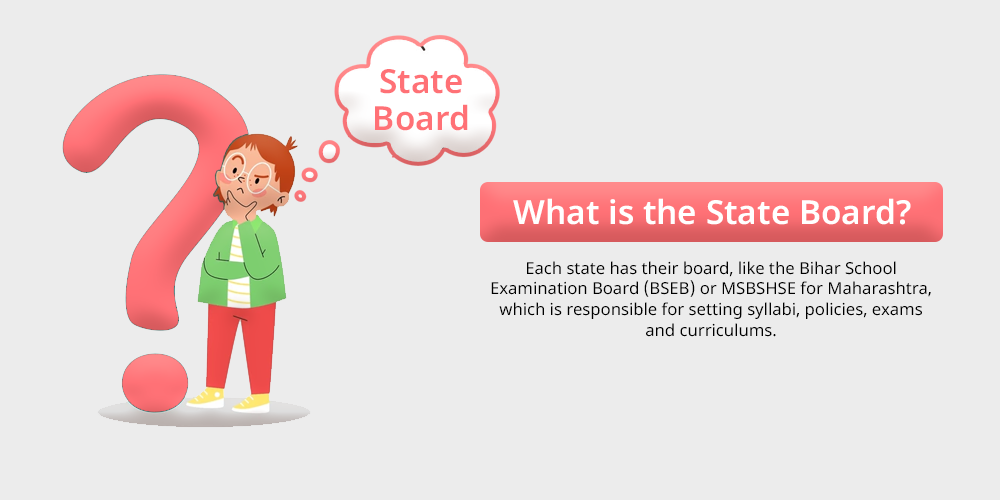
State Board, clear from its name, is an educational board which is managed by any individual state in India.
Each state has their board, like the Bihar School Examination Board (BSEB) or MSBSHSE for Maharashtra, which is responsible for setting syllabi, policies, exams and curriculums.
All the schools which are listed under the state board have to follow the guidelines and supervision of the State Government.
What is CBSE?
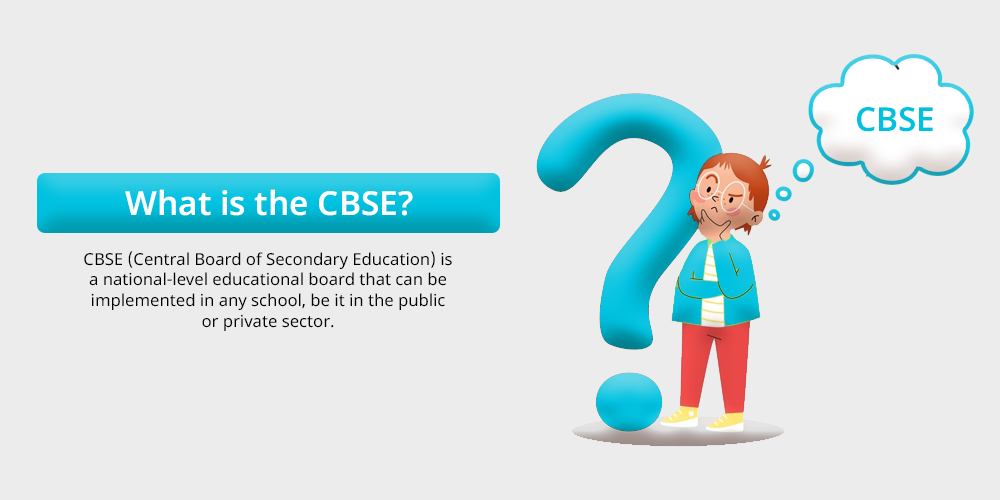
CBSE (Central Board of Secondary Education) is a national-level educational board that can be implemented in any school, be it in the public or private sector. It is being operated and regulated by the Union Government Of India.
Unlike state boards, their policies, syllabus, exam, etc do not vary from state to state, instead, they remain the same for the entire country.
Things to Consider When Transitioning From State Board to CBSE
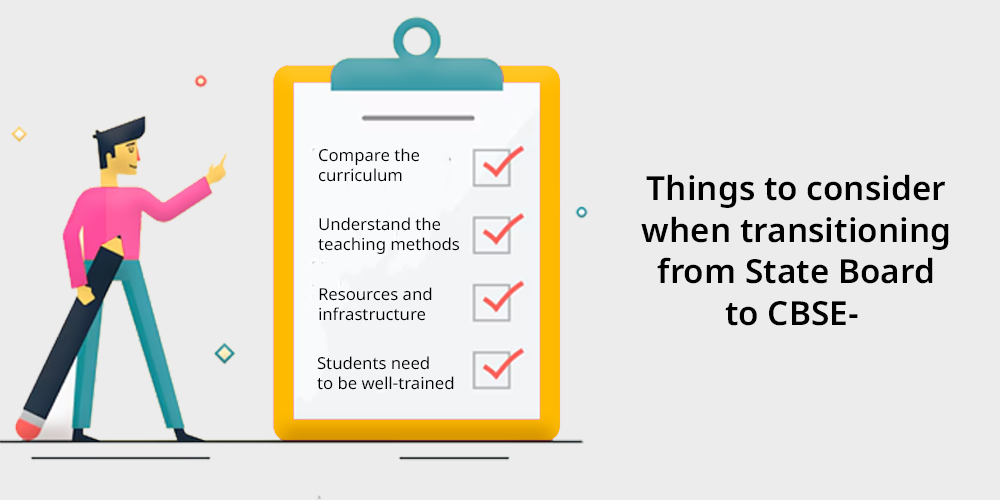
When you are thinking of transitioning from a State Board to CBSE, there are certain things that one should consider.
- Compare the curriculum differences between them.
- Understand the teaching methods and examine the pattern to match CBSE standards.
- Students need to be well-trained before they enter a new system.
- Resources and infrastructure should be the point of discussion.
- Now students, parents, and faculty should come together and discuss different factors for a successful shift.
CBSE Curriculum Tough Why Still Transition From State Board to CBSE
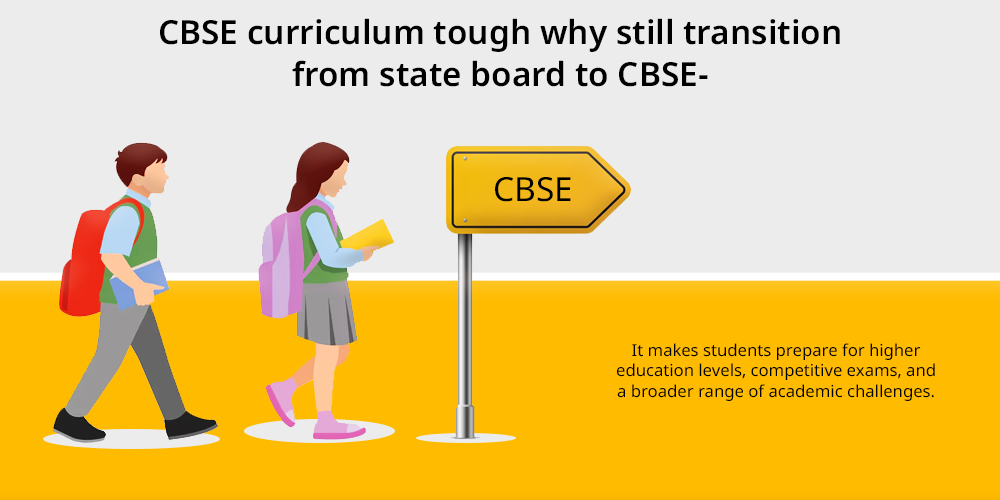
Although the CBSE curriculum is tougher than State Board, the reason why parents still choose the transition is due to the standardised and comprehensive nature of CBSE education.
Certain things attract students towards CBSE due to its standardised & modern curriculum, being nationally recognised, comprehensive evaluation, and giving consistent and uniform education to the students, regardless of their geographical location.
It makes students prepare for higher education levels, competitive exams, and a broader range of academic challenges.
Transitioning From One Board to Another will Affect Student Mental Health
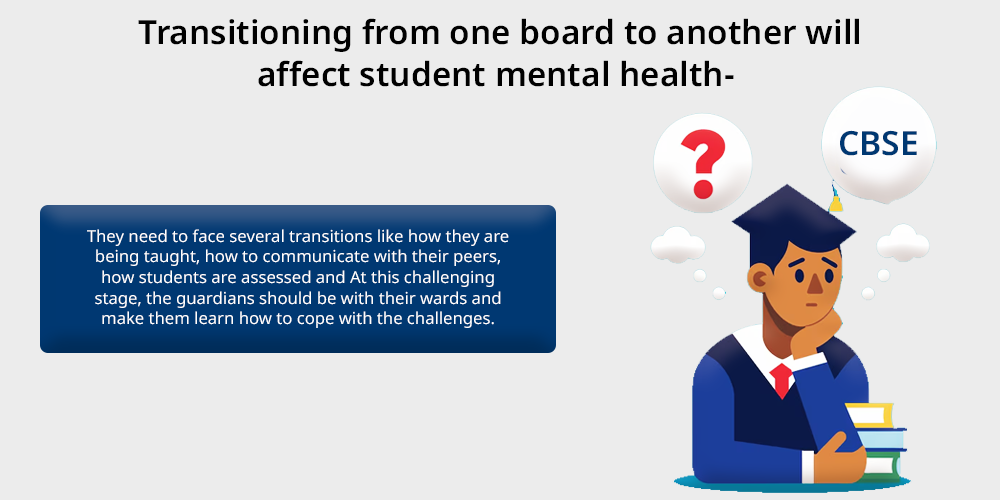
Undoubtedly, when a student is getting prepared to step into a completely new environment, it will have an impact on their mental well-being. It’s not just about a new teaching method but the overall surrounding he/she will be in.
They need to face several transitions like how they are being taught, how to communicate with their peers, how students are assessed and At this challenging stage, the guardians should be with their wards and make them learn how to cope with the challenges.
Also, give them a learning environment and make sure their mental health is not affected too much.
Difference Between CBSE and State Board
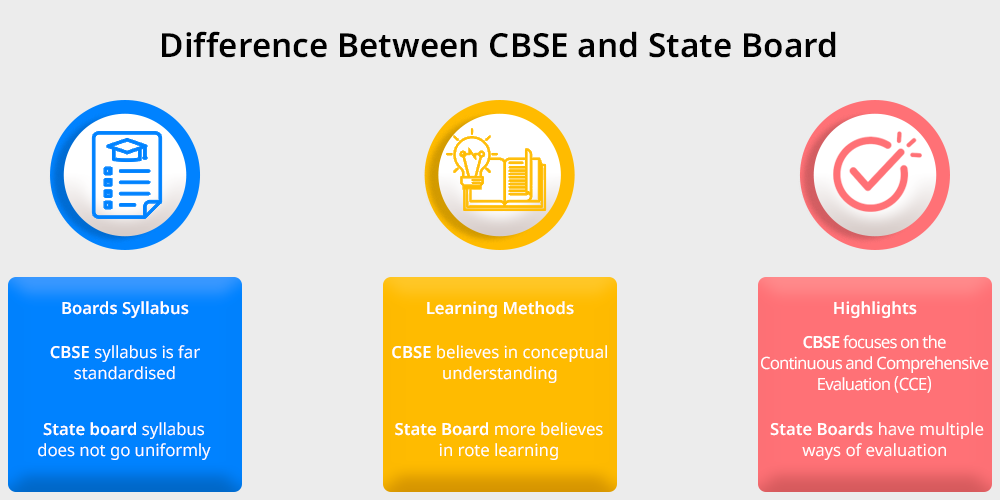
- CBSE vs State Boards Syllabus: The CBSE syllabus is far standardised and is being updated to ensure that it keeps students aware of the dynamic environment outside, i.e., making the student up-to-date. Whereas the State board syllabus does not go uniformly.
It changes as per the states and also does not get updated as frequently. - CBSE vs State Boards Learning Methods: CBSE believes in conceptual understanding. They don’t want students to just believe what they are being taught, instead, they firmly believe in the practical application of what they learn.
This makes them capable of getting solutions, making decent decisions, and overcoming the challenges. On the other hand, the State Board more believes in rote learning and remembering of facts.
- CBSE vs State Boards Highlights: CBSE is firmly focusing on the Continuous and Comprehensive Evaluation (CCE) pattern. It means the students will not only give one final exam at the end of the academic year like in traditional learning methods but will also need to pass various assessments throughout the year.
These continuous assessments help in improving their overall performances as they are regularly involved in different activities and studies.
On the other hand, State Boards have multiple ways of evaluation. One cannot confirm that any method is the only one as the system varies across the states.
Different states have their different ways of evaluation. The most common method is one single set of board exams at the end of the academic year to prove someone’s efficiency.
Advantages and Disadvantages of CBSE Board
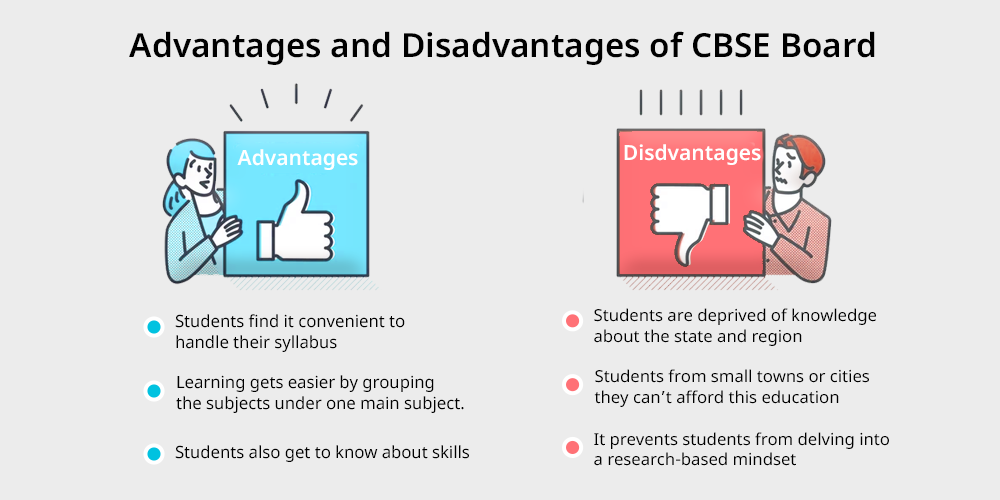
As we know nothing is too good and nothing is too bad. Let’s find out a few advantages and disadvantages of the CBSE Board. First, we go with the advantages-
Advantages
- Students find it convenient to handle their syllabus as it is a compact structure and also due to the practical way of teaching.
- It made learning easier by grouping the subjects under one main subject. It means physics, chemistry, and biology fall under Science while history, civics, and geography lie under Social Science.
- Apart from theoretical knowledge, students also get to know about skills like business studies, entrepreneurship, creative skills, and more that develop them completely.
Disadvantages
- As the syllabus is standardised across the country, the students are deprived of knowledge about the state and region. They may not learn about the local culture and tradition.
- The CBSE cost of education, including multiple sorts of fees and price books, makes it impossible for a wide range of students from small towns or cities to get an education here. They can’t afford this education.
- It prevents students from delving into a research-based mindset as most of the questions asked in the exam are from the prescribed textbooks.
Advantages and Disadvantages of State Board
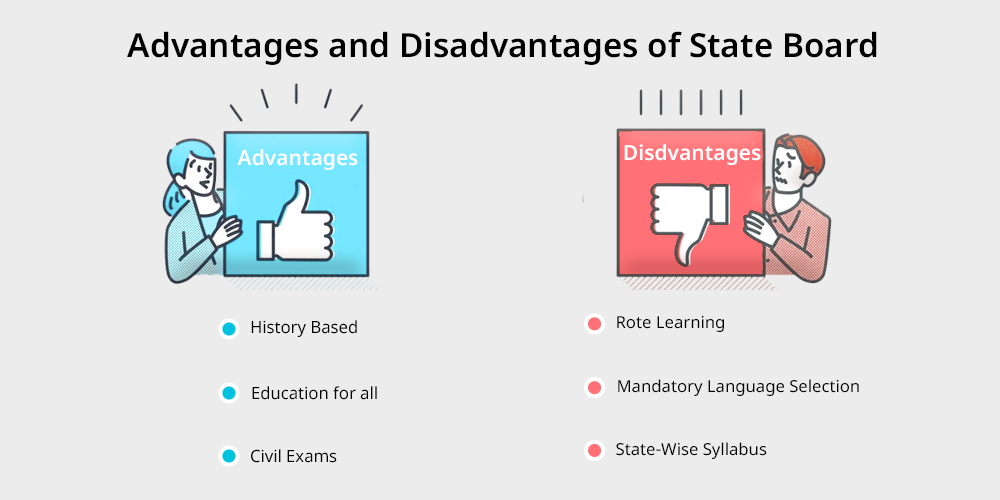
The state board’s contribution to the Indian education system is significant. Let’s see what it provides to the students and where it lacks today. Let’s start with the advantages.
Advantages
- History Based- There are some subjects where the long-lost culture of the state and India are discussed. This boosts their General Knowledge and makes them aware of our cultures.
- Education for all- As the cost of getting educated here is quite reasonable which opens the door for everyone to come and learn. Education should be affordable for all.
- Civil Exams- As they pass the State Board, the students become quite capable of clearing civil services exams.
Disadvantages
- Rote Learning- This is one of the major drawbacks of the State Board. This forces the student to believe what is taught is right as practical learning is not part of this education board.
- Mandatory Language Selection- You need to select three languages for your board exams. It is tedious work to do.
- State-Wise Syllabus- Parents who often need to travel to other states regarding work will find it difficult to enrol their wards at other schools in new states as the syllabus will change in other states.
Advantages of CBSE over State Boards
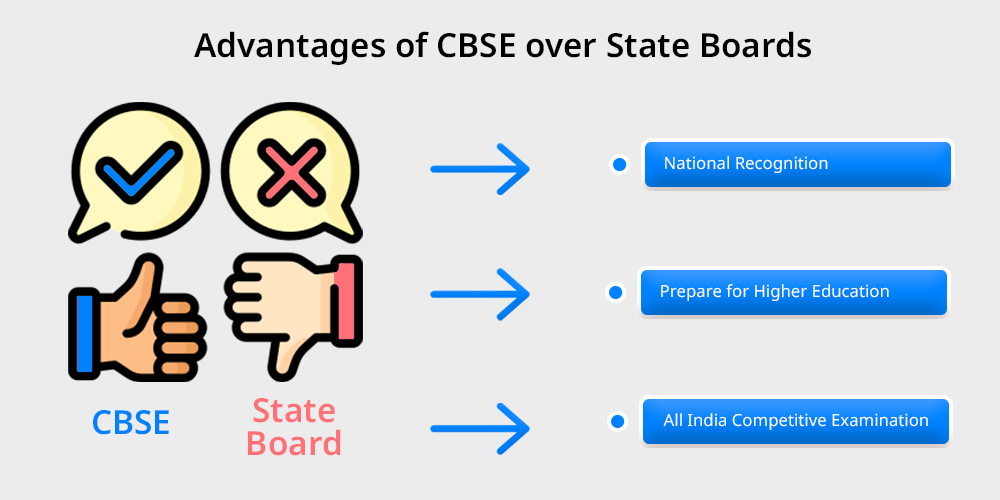
There are certain advantages of the CBSE board over the State Board. Here is the list of some highlighted benefits it;-
- National Recognition: Since CBSE is across the country, it holds national recognition and significance. This makes the way easier for the students holding CBSE certificates to enrol in well-known institutions who are willing to pursue higher education.
- Prepare for Higher Education: The curriculum and evaluation method followed in CBSE is paralleled to what is being done in colleges and universities. By nurturing the students to this level, it makes their shift to higher education easier
- All India Competitive Examination: CBSE designed the syllabus and examination pattern by keeping in mind that it aligns with exams like JEE Main & Advanced, NEET, AIIMS, etc. As a result, the students from the CBSE board look well-equipped to perform well in the battle-field.
CBSE vs State Boards Which is Better for Student Future
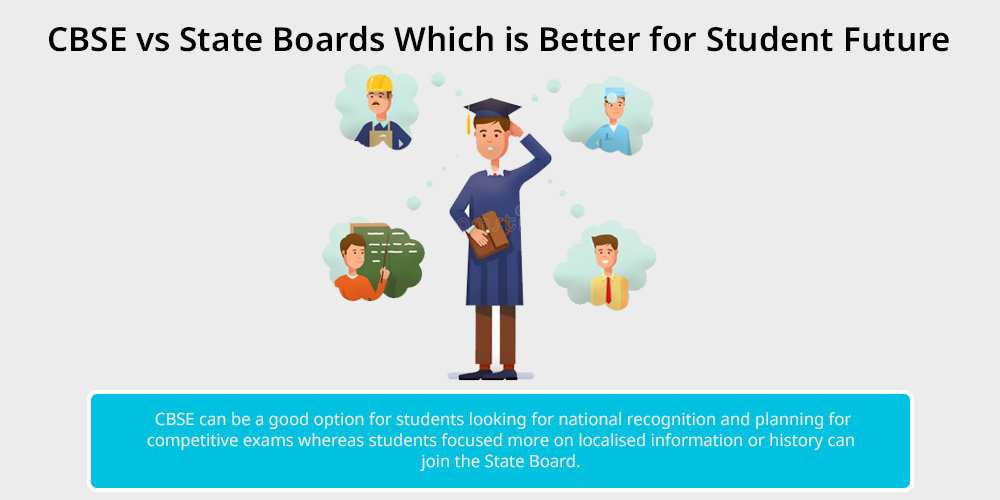
Since you have come to this section of the blog, you might have understood their difference.
CBSE can be a good option for students looking for national recognition and planning for competitive exams whereas students focused more on localised information or history can join the State Board.
However, the choice depends upon the individual preferences!
